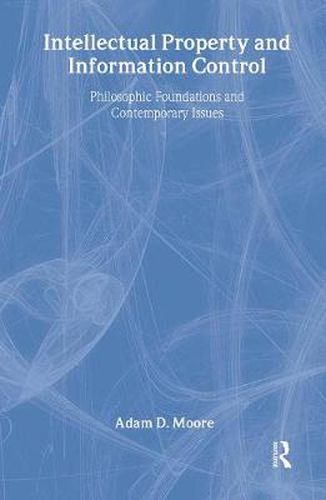Readings Newsletter
Become a Readings Member to make your shopping experience even easier.
Sign in or sign up for free!
You’re not far away from qualifying for FREE standard shipping within Australia
You’ve qualified for FREE standard shipping within Australia
The cart is loading…






Computer technology and the proliferation of digital networks have radically altered how ideas and informa-tion are gathered and manipulated. Debate over the control and ownership of digital information and intellectual property has been waged by two factions. Standing in the way of the cyberpunks, hackers, and net surfers who claim that information wants to be free and that intellectual property rights give undue credit to authors and inventors, are the collected canons of Anglo-American copyright, patent, and trade secret law. Defenders of these institutions typically argue that granting rights to authors and inventors is necessary for the optimal production of intellectual works and corresponding gains in social utility. This conflict between public use and private right raises serious problems: Are abstract ideas and information proper subjects of ownership? What role should privacy rights play? How does the violation of intellectual property rights compare morally to the violation of physical property rights? In Intellectual Property and Information Control, Adam Moore provides answers and strategies for dealing with these and other questions while mounting a philosophical defense of rights to intellectual and intangible property. How we address the tensions between intellectual property rights, public access to information, and individual privacy will profoundly shape the twenty-first century. A policy that allows too much access may stymie innovation and cause individuals to isolate themselves. At the other extreme, huge, multinational corporations may hold as intangible property vast amounts of knowledge, including sensitive personal information. Moore proposes a Lockean model of intellectual property and information control along with recommendations for changes in Anglo-American intellectual property institutions. Through discussions of patent law, fair use and practical problems such as privacy in the workplace, encryption and public policy, Moore demonstrates that intellectual and intangible property rights exist along with privacy rights. The latter will sometimes constrain what can be done with the former. Moore offers a carefully balanced appraisal of where the free flow of information needs to be checked by the walls of privacy. Intellectual Property and Information Control will be of interest to philosophers, legal scholars, and sociologists.
$9.00 standard shipping within Australia
FREE standard shipping within Australia for orders over $100.00
Express & International shipping calculated at checkout
Computer technology and the proliferation of digital networks have radically altered how ideas and informa-tion are gathered and manipulated. Debate over the control and ownership of digital information and intellectual property has been waged by two factions. Standing in the way of the cyberpunks, hackers, and net surfers who claim that information wants to be free and that intellectual property rights give undue credit to authors and inventors, are the collected canons of Anglo-American copyright, patent, and trade secret law. Defenders of these institutions typically argue that granting rights to authors and inventors is necessary for the optimal production of intellectual works and corresponding gains in social utility. This conflict between public use and private right raises serious problems: Are abstract ideas and information proper subjects of ownership? What role should privacy rights play? How does the violation of intellectual property rights compare morally to the violation of physical property rights? In Intellectual Property and Information Control, Adam Moore provides answers and strategies for dealing with these and other questions while mounting a philosophical defense of rights to intellectual and intangible property. How we address the tensions between intellectual property rights, public access to information, and individual privacy will profoundly shape the twenty-first century. A policy that allows too much access may stymie innovation and cause individuals to isolate themselves. At the other extreme, huge, multinational corporations may hold as intangible property vast amounts of knowledge, including sensitive personal information. Moore proposes a Lockean model of intellectual property and information control along with recommendations for changes in Anglo-American intellectual property institutions. Through discussions of patent law, fair use and practical problems such as privacy in the workplace, encryption and public policy, Moore demonstrates that intellectual and intangible property rights exist along with privacy rights. The latter will sometimes constrain what can be done with the former. Moore offers a carefully balanced appraisal of where the free flow of information needs to be checked by the walls of privacy. Intellectual Property and Information Control will be of interest to philosophers, legal scholars, and sociologists.